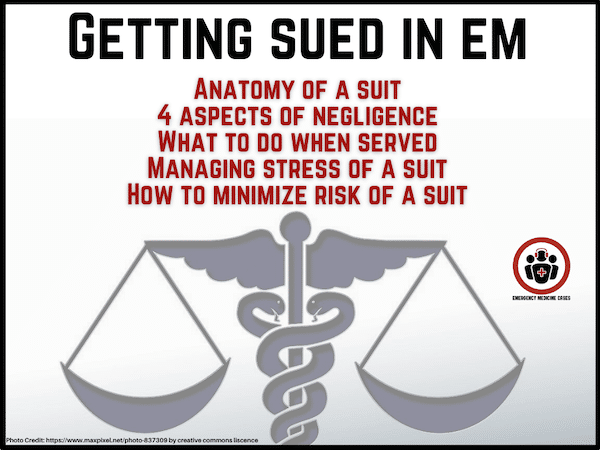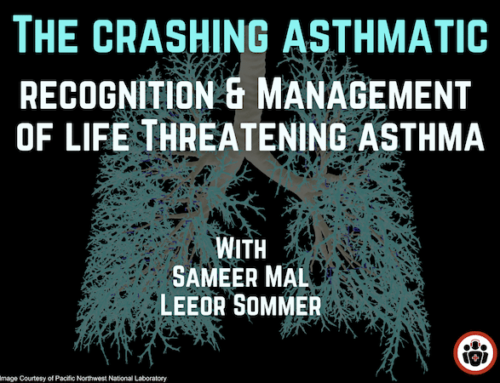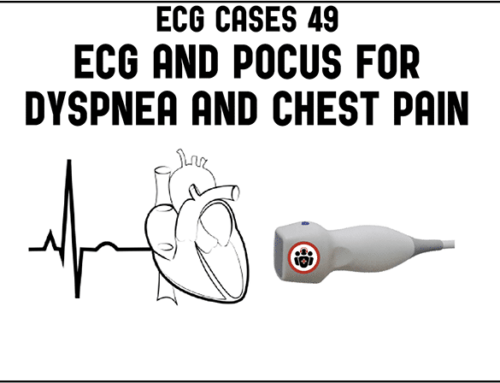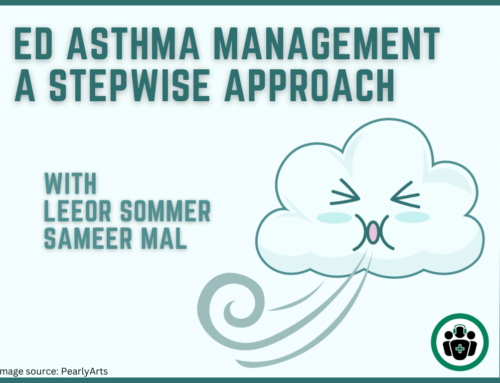If you are an Emergency Physician, the likelihood that you will be named in a civil law suit some time in your career is very high. This is not surprising given the nature of our specialty and that we each take care of thousands of patients over many years of practice. Being prepared for getting sued in Emergency Medicine, understanding the legal process and learning how to cope with getting sued are key in continuing to provide high quality care to your patients and maintaining peace of mind. Hans Rosenberg, our special guest host for this podcast, joins Dr. Janet Nuth, an Emergency Physician in Ottawa and Physician Advisor in Safe Medical Care Learning at the Canadian Medical Protective Association (CMPA) and Ms. Brieanne Brannagan, a litigator specializing in medical defence in Ottawa to answer such question as: How many civil actions against Emergency Physicians does CMPA handle and what have been the outcomes? What are the 4 aspects of medical negligence and the anatomy of a legal action against physicians in Canada? What are the 3 stages of civil action in a medicolegal law suit in Canada? How should you respond when you are served with a medicolegal action? How can you minimize the stress associated with getting sued? What is the role of expert evidence in medical negligence actions? What strategies can we use to lower the risk of getting sued for medical negligence based on CMPA data and ED chiefs’ opinions and many more…
Podcast production by Hans Rosenberg, sound design by Anton Helman
Written Summary and blog post by Hans Rosenberg, February 2022
Cite this podcast as: Rosenberg, H. Nuth, J. Brannagan, B. Getting Sued in Emergency Medicine – Practical Tips. Emergency Medicine Cases. February, 2022.a https://emergencymedicinecases.com/getting-sued-emergency-medicine. Accessed [date]
The information shared in this podcast and summary of the podcast is provided for the purposes of general information and education for use only in Canada. The information provided is not intended to provide specific professional medical or legal advice or constitute a standard of care.
What is the role of the Canadian Medical Protective Association (CMPA)?
The CMPA is a mutual defence organization that represents over 100,000 Canadian physicians (over 95% are members) who’s role is to protect the professional integrity of physicians, promote safe medical care, and appropriately compensate patients proven to have been harmed by negligent care.
How many civil actions against Emergency Physicians does CMPA handle and what have been the outcomes?
Data from 5-year analysis 2016-2020 by CMPA
- 11% of all civil actions handled by the CMPA against Canadian physicians involved emergency physicians practicing in EDs totalling 437 civil actions (about 87/year)
- Out of these 37 % had an unfavourable legal outcomes for the physician ( lower than average for all CMPA members = 43% ); almost all of these, (36 %), involved settlements
- 5% of total emergency medicine actions go to trial
The 4 aspects of medical negligence and the anatomy of a legal action against physicians in Canada
In civil suits medical negligence must be proven by the plaintiff based on the balance of probabilities rather than beyond a reasonable doubt like in criminal suits and on all of the following (except in Quebec which has 3 aspects – fault, harm and causation):
- Duty of Care – usually admitted or not contested and is present even if the patient was not physically assessed by the physician but just gave an opinion over the phone.
- Standard of Care – the “reasonable physician” test – care and skill that would normally be expected of a normal prudent practitioner of the same experience and standing (takes into account training, resources available at the time without hindsight bias and without demanding perfection); note that there is room for differing clinical opinions and even wrong judgment calls, standard of care does not demand or mean perfect care
- Causation – the specific breach of standard of care needs to have a causal link to patients injury/harm/loss – “but for the physician’s negligence, the injury would not have occurred”
- Harm – plaintiff must have suffered some kind of injury, loss or damage that they are seeking compensation for
CMPA e-learning activities on medical negligence
The 3 stages of civil action in a medicolegal law suit in Canada
- Pleadings stage – statements of claim and defence; the statement of claim sets out, in a concise manner, the facts and particulars on which the plaintiff is relying to establish a cause of action or alleged wrongdoing against the defendant. It is not unusual for the statement of claim to include allegations that challenge the defendant physician’s competence and reputation.
- Discovery stage – exchange documents and the oral questioning which is the examination for discovery, typically the most stressful stage
- Resolution stage – path from here depends on the strength of your defence, which can involve mediation or a trial
The 3 outcomes of a medical negligence action in Canada
Outcomes of legal action look to answer the question “is the defendant liable/legally responsible for the damage caused to the plaintiff?”
Dismissal/discontinuance – action has been dropped
Settlement – money is paid to plaintiff on behalf of the defendant to bring an end to the action
Trial – before a judge and/or jury (dependent on jurisdiction)
Cases vary in length but can last many years (a marathon, not a sprint)
Preparing for examination for discovery
- Prepare with your legal counsel prior to date of examination for discovery
- Typically most stressful stage
- Questioning comes from a non-medical professional
- Attended with your legal counsel to ensure questions are reasonable and appropriate
- Can take place in a court recorder’s office, however may be online during the COVID pandemic
What is the role of expert evidence in medical negligence actions?
- Subject matter in a medicolegal action requires medical expert evidence to establish or rebut the claims being made, particularly for standard of care and causation; this evidence is needed at trial to establish medical negligence
- This burden is the plaintiffs to establish – but defendants also obtain expert evidence to potentially rebut
- Expert should ideally be someone who has similar training, work environment (eg. tertiary care vs rural) and does not have a conflict of interest such that they can be objective and impartial; CMPA also considers if they are strong communicators and if they have medical legal experience, testified before etc.
- When the legal counsel is assessing the defensibility of a case, they assess the experts, the plaintiffs’ experts and any other co-defendants’ experts to assess the strengths/weaknesses of their defence; this helps them to make the best recommendation to the physician and CMPA.
How to respond when you are served with medicolegal action
- Take a deep breath, slow down your thoughts and actions and contact CMPA as soon as feasible
- When physician members call, they speak to one of over 45 experienced physician advisors who knows how challenging it can be to practice medicine and who will provide advice; speaking to a Physician Advisor can help them through the process and goes a long way to alleviate that stress.
- Members are put in contact with legal counsel from one of the provincial law firms who often are in touch with them that day.
- Do not go into the chart, contact the patient or the patient’s family; wait to get advice first from your skilled CMPA physician advisor and then your legal counsel.
Managing the stress of a medicolegal action
- When patients suffer a poor outcome and later initiate a lawsuit, physicians may experience a variety of emotions including feeling shame or guilt some report feeling betrayed, angry, or disappointed
- Many physicians report difficulty with sleep, concentration, second guessing decisions and some even have thoughts about leaving medicine
- Going through a legal action can feel very isolating but you are not alone; get the support you need and do not hesitate to access resources available
- While clinical details of the case should not be discussed with anyone other than the physician advisor and legal counsel it is important to use support network of colleagues, friends, family regarding feelings and emotions around the case; many centers have developed peer support programs with mentors
- Legal counsel can provide support, demystify the process and debunk worst case scenarios
- Create a plan to stay healthy – do not ignore good sleep hygiene, diet and exercise etc.
- Even if you are found to not have met the standard of care, this does not mean that you are not a great doctor
- If there is something to learn from the case, educate yourself and consider teaching colleagues/learners about lessons learned after the case is resolved
- The test for negligence has no element of intent; care that results in patient harm are often the result of many factors, some under your control, some not (Swiss cheese effect); you can be reassured, that in those circumstances CMPA makes sure patients are appropriately compensated; and what matters most is how you move forward from it, learn and regain your confidence so you can get back to doing what you do best—providing quality care for your patients.
CMPA physician wellness resources
Episode 103 Preventing Burnout and Promoting Wellness in Emergency Medicine
The mindful self-compassion workbook by Kristin Neff
How to minimize the risk of getting sued for medical negligence based on CMPA data and ED chiefs’ opinions
The Common patterns that the CMPA sees over and over are the following:
- Issues with clinical decision making and particularly of the basic assessment – check for pertinent positives and negative on history and physical, risk factors – past medical history and family history of critical diagnoses
- Documentation – not only pertinent positive and negatives but a reasonable thought process of differential diagnosis. Justify your reasoning. However, it is not expected that it is a transcription of what occurred. Leave your “intellectual footprint” on the chart
- Pay attention to vitals and changes in vitals and repeat vitals prior to discharge if they came in abnormal
- Pay attention to nurse concerns, both verbal and written
- Develop a culture where allied health feels comfortable voicing their concerns
- Patients with repeated presentations for evolving or unresolved symptoms are high risk
- Take time to address questions and concerns that your patient has
- Take time to explain and document discharge instructions including timing and location of follow up and urgency of the response
Additional tips on how to minimize the risk of getting sued and managing the stress of getting sued from several ED chiefs
- Be polite, professional, kind, positive in all your patient interactions
- One negative outcome does not make the physician a poor clinician; one error in judgment in one case is entirely expected to occur over the course of your career
- Do not take to heart the language of the statement of claim
- Make yourself available to others who are going through similar struggles
- Understand that the anxiety one may feel after being served is driven by the culture of infallibility in EM
- Your job is not to be perfect or to see the future, and the legal process respects this; understand that the feeling that you need to be perfect may lead to to anxiety and unnecessary testing
- It’s normal for your clinical confidence to wain after getting served, so review cases with colleagues that you’re having difficulty with
There is some evidence to suggest that the more self-compassionate you are the more compassionate you will be with your patients; as explained in Episode 145 Physician Compassion, the more compassionate you are with your patients the less likely you are to get sued
A special thanks to Drs. Eddy Lang, Howard Ovens, Eric Letovsky, Allen Bell, Amit Shaw, Guy Hebert and Adam Quinn for providing their quick tips on managing getting sued in this podcast
Further resources for getting sued in EM
- CMPA Medicolegal handbook for physicians in Canada
- CMPA Good Practices Guide- Complaints and legal actions
- Healthcare wellbeing and Medical Error video with Sara Gray from SMACC
Quote of the month
I know a lot of great physicians who have been sued who have a great career and a happy life afterwards
-Dr. Adam Cwin
DISCLAIMER: The information contained in this learning material is for general educational purposes only and is not intended to provide specific professional medical or legal advice, nor to constitute a “standard of care” for Canadian healthcare professionals. The use of CMPA learning resources is subject to the foregoing as well as the CMPA’s Terms of Use.





Leave A Comment